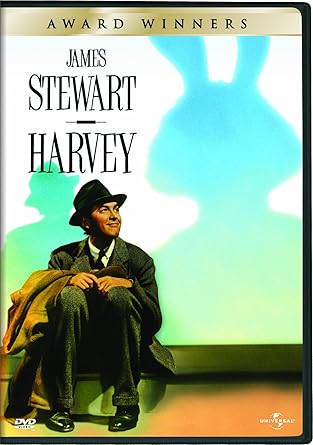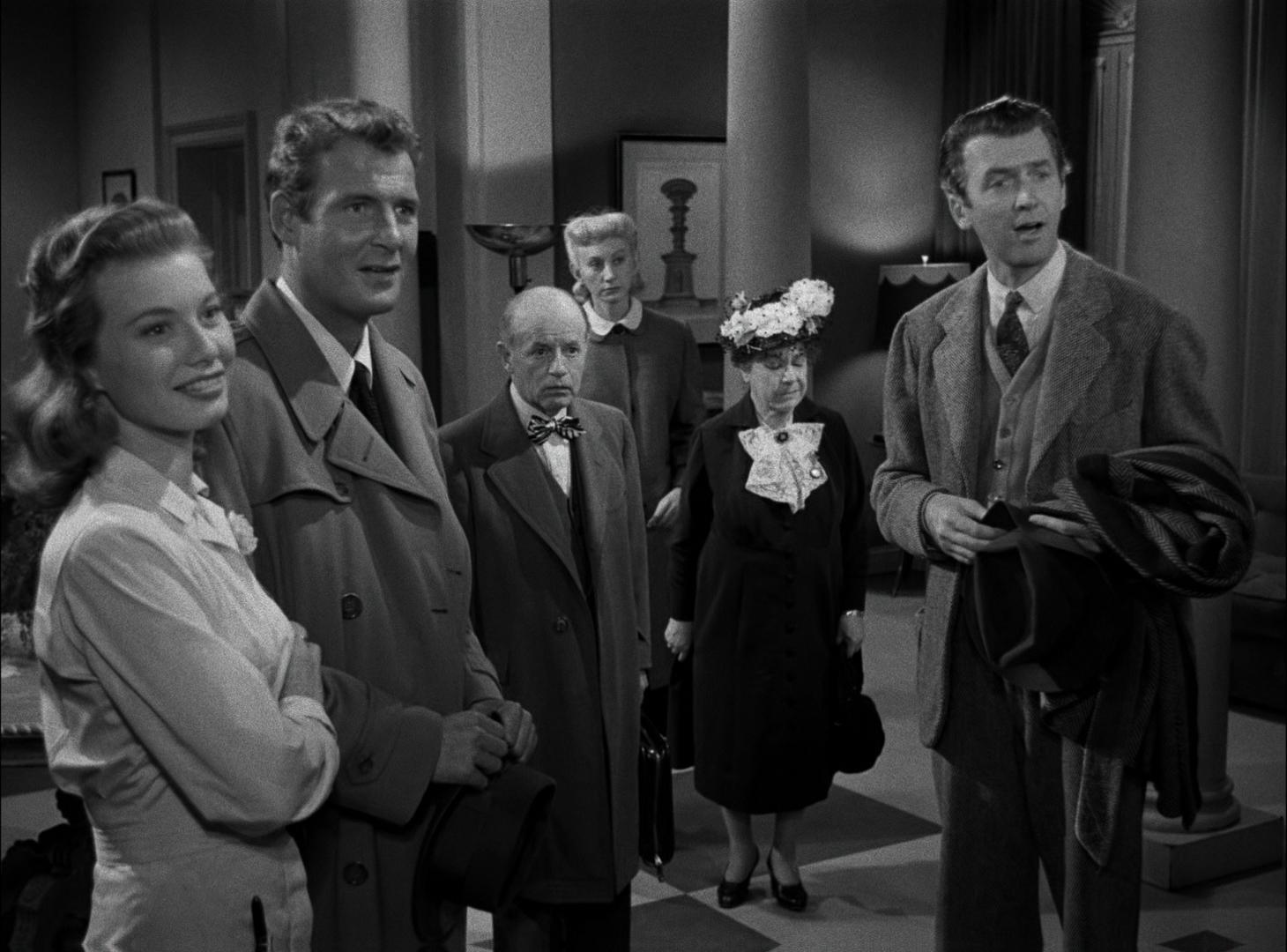← Back to Reviews
in
Harvey
A magical performance by James Stewart in the starring role is the heart of a whimsical 1950 comedy called Harvey, that cleverly combines slapstick comedy. fantasy, romance, and the audience's imagination to create a truly unique and enchanting film experience that still provides sparkling entertainment after 70 years.

Stewart plays Elwood P. Dowd, a sweet-natured and eccentric man who gives out business cards to everyone he meets (even though he doesn't appear to have a job) and goes to a bar every day and has martinis with his best friend, an invisible rabbit named Harvey who stands 6 feet and 3 and a half inches tall. Elwood's sister, Veda and his spinsterish niece Myrtle think he's insane and Veda decides to have Elwood committed to a mental hospital.

A comedy of errors commences when, upon arrival at the hospital, Veda ends up being committed and Elwood finds himself advancing the stalled romance between Dr. Sanderson and Nurse Kelly, who work at the hospital, as well as completely befuddling Dr. Chumley, the head of the hospital. Another relationship blooms between Myrtle and a wise-cracking hospital aide named Wilson.

The film is based on a Pulitzer Prize winning play by Mary Chase that premiered on Broadway in 1949 and ran for over 1700 performances. Chase was actually allowed to adapt her own play into a warm and often wacky story that takes the concept of the childhood imaginary friend to a different level. Even though a lot of people in Dowd's life think he is insane because they believe Harvey is imaginary, the premise here seems to be that Harvey is not imaginary, but invisible, evidenced by a mid-story plot twist where Dowd shows up with a painting of he and Harvey together. This is where the audience's imagination comes in.

The screenplay never really commits to whether Harvey is imaginary or invisible, but does commit to Dowd's relationship with the rabbit, that is so real to Dowd that we are in the final act of the story before Dowd even realizes that his sister is trying to have him committed and, of course, he doesn't understand why. Audience imagination really kicks in during a scene in the second act, brilliantly performed by Stewart, where Dr. Sanderson tries to convince Dowd that Harvey is really a symbol from someone's past. Dowd denies it, but the way the scene is played we're never really sure. Our belief regarding Harvey is strengthened when Dowd somehow gets Dr. Chumley to believe, with the aid of visual effects. Dowd's belief is never swayed and he never commits to imagination or invisibility, which is what makes this story so enchanting.

The film features rich production values, including gorgeous black and white photography that bring a layer of reality to the insanity. Ten years after winning his first Oscar for The Philadelphia Story, Stewart received his fourth Best Actor nomination for his Elwood P. Dowd and veteran Josephine Hull won the Oscar for Best Supporting Actress for her dotty Veda. Cecil Kellaway offers one of his strongest performances as Dr. Chumley and Jesse White steals every scene he's in as Wilson. A warm and winning movie classic that will have the viewer wondering if Harvey exists.
A magical performance by James Stewart in the starring role is the heart of a whimsical 1950 comedy called Harvey, that cleverly combines slapstick comedy. fantasy, romance, and the audience's imagination to create a truly unique and enchanting film experience that still provides sparkling entertainment after 70 years.

Stewart plays Elwood P. Dowd, a sweet-natured and eccentric man who gives out business cards to everyone he meets (even though he doesn't appear to have a job) and goes to a bar every day and has martinis with his best friend, an invisible rabbit named Harvey who stands 6 feet and 3 and a half inches tall. Elwood's sister, Veda and his spinsterish niece Myrtle think he's insane and Veda decides to have Elwood committed to a mental hospital.

A comedy of errors commences when, upon arrival at the hospital, Veda ends up being committed and Elwood finds himself advancing the stalled romance between Dr. Sanderson and Nurse Kelly, who work at the hospital, as well as completely befuddling Dr. Chumley, the head of the hospital. Another relationship blooms between Myrtle and a wise-cracking hospital aide named Wilson.

The film is based on a Pulitzer Prize winning play by Mary Chase that premiered on Broadway in 1949 and ran for over 1700 performances. Chase was actually allowed to adapt her own play into a warm and often wacky story that takes the concept of the childhood imaginary friend to a different level. Even though a lot of people in Dowd's life think he is insane because they believe Harvey is imaginary, the premise here seems to be that Harvey is not imaginary, but invisible, evidenced by a mid-story plot twist where Dowd shows up with a painting of he and Harvey together. This is where the audience's imagination comes in.

The screenplay never really commits to whether Harvey is imaginary or invisible, but does commit to Dowd's relationship with the rabbit, that is so real to Dowd that we are in the final act of the story before Dowd even realizes that his sister is trying to have him committed and, of course, he doesn't understand why. Audience imagination really kicks in during a scene in the second act, brilliantly performed by Stewart, where Dr. Sanderson tries to convince Dowd that Harvey is really a symbol from someone's past. Dowd denies it, but the way the scene is played we're never really sure. Our belief regarding Harvey is strengthened when Dowd somehow gets Dr. Chumley to believe, with the aid of visual effects. Dowd's belief is never swayed and he never commits to imagination or invisibility, which is what makes this story so enchanting.

The film features rich production values, including gorgeous black and white photography that bring a layer of reality to the insanity. Ten years after winning his first Oscar for The Philadelphia Story, Stewart received his fourth Best Actor nomination for his Elwood P. Dowd and veteran Josephine Hull won the Oscar for Best Supporting Actress for her dotty Veda. Cecil Kellaway offers one of his strongest performances as Dr. Chumley and Jesse White steals every scene he's in as Wilson. A warm and winning movie classic that will have the viewer wondering if Harvey exists.
